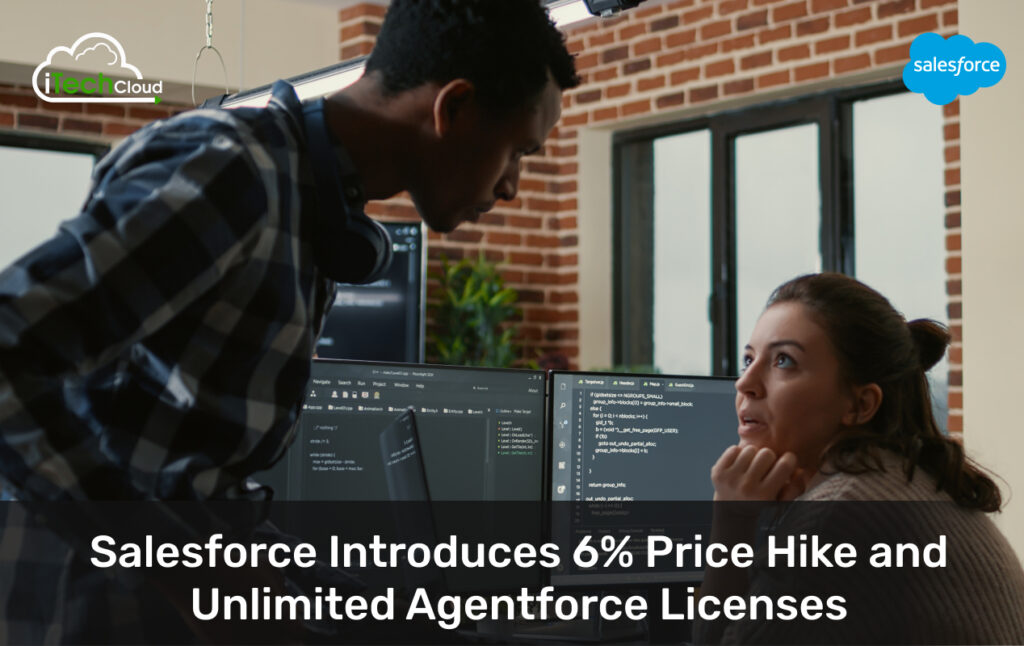Salesforce Introduces 6% Price Hike and Unlimited Agentforce Licenses

Introduction: Salesforce Introduces 6% Price Hike and Unlimited Agentforce Licenses
Salesforce, the global leader in customer relationship management (CRM) software, has announced two major updates that will significantly impact its pricing and licensing structure:
- A 6% price increase across several of its cloud products.
- The introduction of unlimited Agentforce licenses, expanding flexibility for customer service teams.
These changes come as businesses continue to rely heavily on digital transformation and cloud-based solutions to enhance customer engagement, streamline operations, and drive revenue growth.
Table of Contents
Why Is Salesforce Increasing Prices?
Salesforce last implemented a broad price increase in 2018, making this the first major adjustment in six years. Several factors contribute to this decision:
1. Inflation and Rising Operational Costs
Salesforce faces increased infrastructure, labor, and R&D expenses. The 6% hike aligns with broader economic trends, including inflation and higher cloud service costs.
2. Continued Investment in AI and Innovation
Salesforce has heavily invested in Einstein AI, Data Cloud, and Slack integrations. The price increase helps fund further advancements in automation, analytics, and AI-driven CRM capabilities.
3. Market Dominance and Value Proposition
With over 20% market share in the CRM space, Salesforce remains the industry standard. The company justifies the increase by emphasizing its expanding feature set, scalability, and ROI for enterprises.
4. Competitive Positioning Against Microsoft, Oracle, and HubSpot
While competitors like Microsoft Dynamics 365 and HubSpot have also adjusted pricing, Salesforce aims to maintain its premium positioning while offering unmatched enterprise-grade solutions.
Breaking Down the 6% Price Increase
The price hike affects multiple Salesforce clouds, though some products remain unchanged. Here’s a detailed breakdown:
1. Sales Cloud and Service Cloud (Core Products)
- Sales Cloud Professional: Rises from $80 to $85 per user/month
- Service Cloud Enterprise: Increases from $150 to $159 per user/month
- Unlimited Edition: Jumps from $330 to $350 per user/month
2. Marketing Cloud and Commerce Cloud
- Marketing Cloud Engagement: ~6% increase (varies by tier)
- Commerce Cloud (B2B & B2C): Slight adjustments, particularly for high-volume merchants
3. Platform and Analytics (Tableau, MuleSoft)
- Tableau Creator: Increases from $70 to $75 per user/month
- MuleSoft Integration Cloud: Small uptick for enterprise plans
4. Industries (Financial Services, Health Cloud)
- Veeva (Life Sciences): No change (due to separate pricing agreements)
- Financial Services Cloud: ~6% increase for premium tiers
5. What’s Not Changing?
- Essentials Edition ($25/user/month) remains unchanged, targeting SMBs.
- Nonprofit and education discounts stay intact.
- Existing contracts are grandfathered until renewal.
Unlimited Agentforce Licenses: A Game-Changer for Customer Service
Alongside the price adjustments, Salesforce introduced unlimited Agentforce licenses, a major shift for Service Cloud users.
What Are Agentforce Licenses?
Agentforce licenses are designed for high-volume, low-complexity customer service agents (e.g., call center reps). Previously, these licenses had strict usage limits.
Key Benefits of Unlimited Agentforce
1. Cost Efficiency
- Traditional full-service cloud licenses can cost $150+/user/month, while Agentforce was historically cheaper but restrictive.
- Unlimited usage removes bottlenecks for businesses with large support teams.
2. Scalability for Enterprises
- Companies like telecoms, airlines, and retail chains can now scale agents without worrying about per-seat costs.
3. Flexible Role-Based Access
- Admins can assign limited or full CRM access based on agent needs, improving security and cost control.
4. Better Alignment with AI and Automation
- With Einstein AI handling routine queries, businesses need more agents for complex cases unlimited licenses support this shift.
Potential Drawbacks
- Not for Power Users: Unlimited Agentforce is ideal for basic support roles but lacks advanced features like Case Management or Omnichannel Routing (which still require full licenses).
- Possible Over-Licensing: Companies must audit usage to avoid paying for unused seats.
How Businesses Should Prepare for These Changes
1. Audit Your Current Salesforce Spend
- Identify which users need full licenses vs. Agentforce.
- Use Salesforce Optimizer to eliminate redundant licenses.
2. Negotiate with Salesforce Before Renewal
- Enterprises with large contracts can often secure discounts or custom pricing.
- Consider multi-year commitments for better rates.
3. Unlimited Agentforce Strategically
- Shift high-volume, low-complexity agents to Agentforce while keeping full licenses for managers and specialists.
4. Explore Alternative Pricing Models
- Platform Licenses: Cheaper for users who only need limited CRM access.
- Partner Programs: Some resellers offer discounts not available directly from Salesforce.
5. Optimize Usage with AI and Automation
- Deploy Einstein Bots to reduce dependency on human agents.
- Use Flow Automation to streamline repetitive tasks.
My Takeaway:
Salesforce’s 6% price increase reflects its continued investment in AI, data, and customer experience. While the adjustment may strain some budgets, the introduction of unlimited Agentforce licenses provides a valuable cost-saving opportunity for customer service teams.

